Entrepreneurship: Small Business, Economy & Traits Analysis
VerifiedAdded on 2023/06/17
|26
|7611
|172
Report
AI Summary
This report provides a detailed analysis of entrepreneurship and small business management, covering various types of entrepreneurial ventures and their relationship to different typologies of entrepreneurship. It investigates the diverse range of entrepreneurial ventures, demonstrating an understanding of entrepreneurship in both the public and corporate sectors. The report assesses relevant data and statistics to illustrate the impact of micro and small businesses on the economy, explaining the importance of small businesses and start-ups to the growth of the social economy. It evaluates the differences small, medium, and large businesses make to the economy, applying relevant data and statistics, and critically evaluates how small businesses impact different levels of the economy, including local, regional, national, and international contexts. Furthermore, the report determines the characteristic traits and skills of successful entrepreneurs that differentiate them from other business managers, explores different lines of argument relating to entrepreneurial characteristics, and examines how background and experience can hinder or foster entrepreneurship. Finally, it analyzes the link between entrepreneurial characteristics and the influence of personal background and experience to specific successful entrepreneurs.

Entrepreneurship and
small business
management
Table of Contents
small business
management
Table of Contents
Paraphrase This Document
Need a fresh take? Get an instant paraphrase of this document with our AI Paraphraser
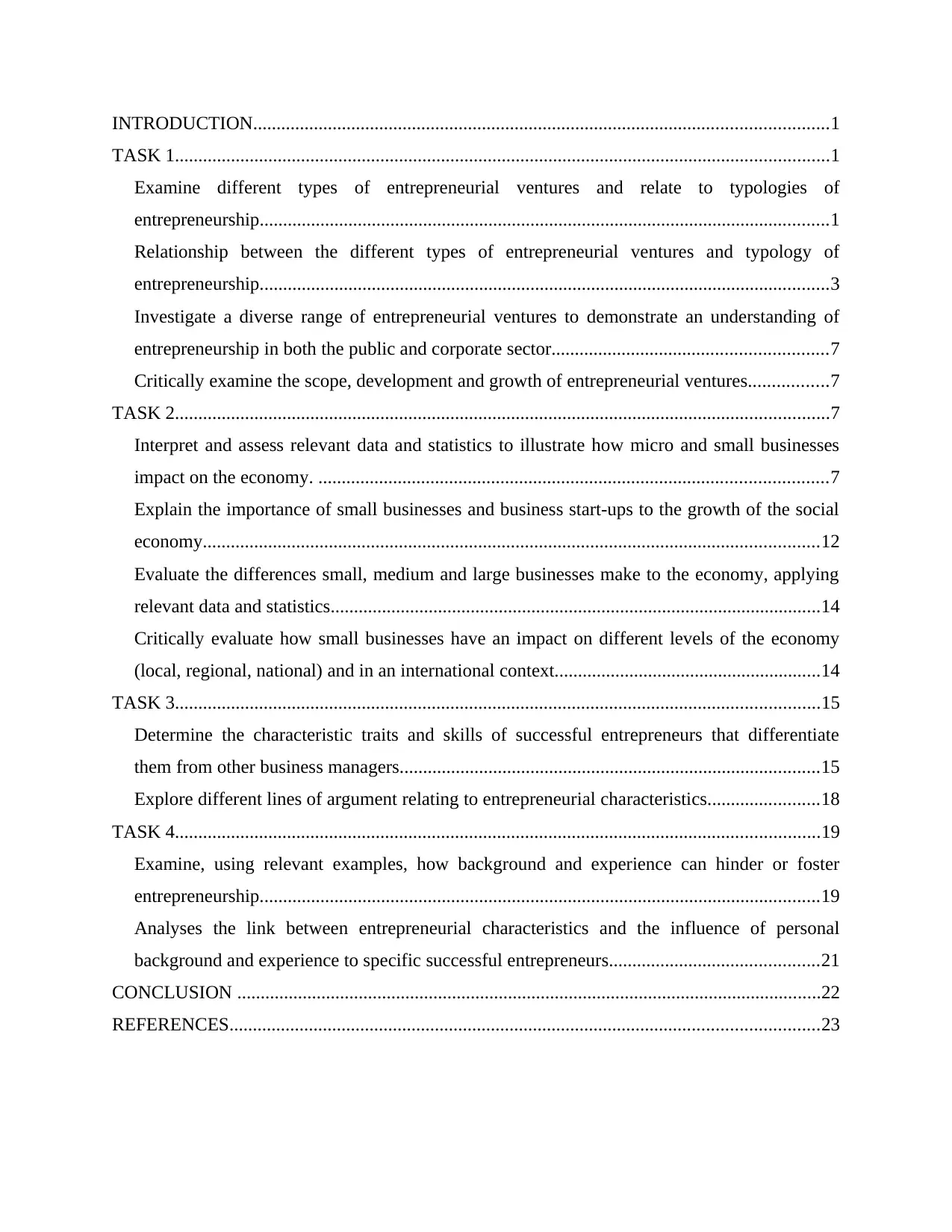
INTRODUCTION...........................................................................................................................1
TASK 1............................................................................................................................................1
Examine different types of entrepreneurial ventures and relate to typologies of
entrepreneurship..........................................................................................................................1
Relationship between the different types of entrepreneurial ventures and typology of
entrepreneurship..........................................................................................................................3
Investigate a diverse range of entrepreneurial ventures to demonstrate an understanding of
entrepreneurship in both the public and corporate sector...........................................................7
Critically examine the scope, development and growth of entrepreneurial ventures.................7
TASK 2............................................................................................................................................7
Interpret and assess relevant data and statistics to illustrate how micro and small businesses
impact on the economy. .............................................................................................................7
Explain the importance of small businesses and business start-ups to the growth of the social
economy....................................................................................................................................12
Evaluate the differences small, medium and large businesses make to the economy, applying
relevant data and statistics.........................................................................................................14
Critically evaluate how small businesses have an impact on different levels of the economy
(local, regional, national) and in an international context.........................................................14
TASK 3..........................................................................................................................................15
Determine the characteristic traits and skills of successful entrepreneurs that differentiate
them from other business managers..........................................................................................15
Explore different lines of argument relating to entrepreneurial characteristics........................18
TASK 4..........................................................................................................................................19
Examine, using relevant examples, how background and experience can hinder or foster
entrepreneurship........................................................................................................................19
Analyses the link between entrepreneurial characteristics and the influence of personal
background and experience to specific successful entrepreneurs.............................................21
CONCLUSION .............................................................................................................................22
REFERENCES..............................................................................................................................23
TASK 1............................................................................................................................................1
Examine different types of entrepreneurial ventures and relate to typologies of
entrepreneurship..........................................................................................................................1
Relationship between the different types of entrepreneurial ventures and typology of
entrepreneurship..........................................................................................................................3
Investigate a diverse range of entrepreneurial ventures to demonstrate an understanding of
entrepreneurship in both the public and corporate sector...........................................................7
Critically examine the scope, development and growth of entrepreneurial ventures.................7
TASK 2............................................................................................................................................7
Interpret and assess relevant data and statistics to illustrate how micro and small businesses
impact on the economy. .............................................................................................................7
Explain the importance of small businesses and business start-ups to the growth of the social
economy....................................................................................................................................12
Evaluate the differences small, medium and large businesses make to the economy, applying
relevant data and statistics.........................................................................................................14
Critically evaluate how small businesses have an impact on different levels of the economy
(local, regional, national) and in an international context.........................................................14
TASK 3..........................................................................................................................................15
Determine the characteristic traits and skills of successful entrepreneurs that differentiate
them from other business managers..........................................................................................15
Explore different lines of argument relating to entrepreneurial characteristics........................18
TASK 4..........................................................................................................................................19
Examine, using relevant examples, how background and experience can hinder or foster
entrepreneurship........................................................................................................................19
Analyses the link between entrepreneurial characteristics and the influence of personal
background and experience to specific successful entrepreneurs.............................................21
CONCLUSION .............................................................................................................................22
REFERENCES..............................................................................................................................23
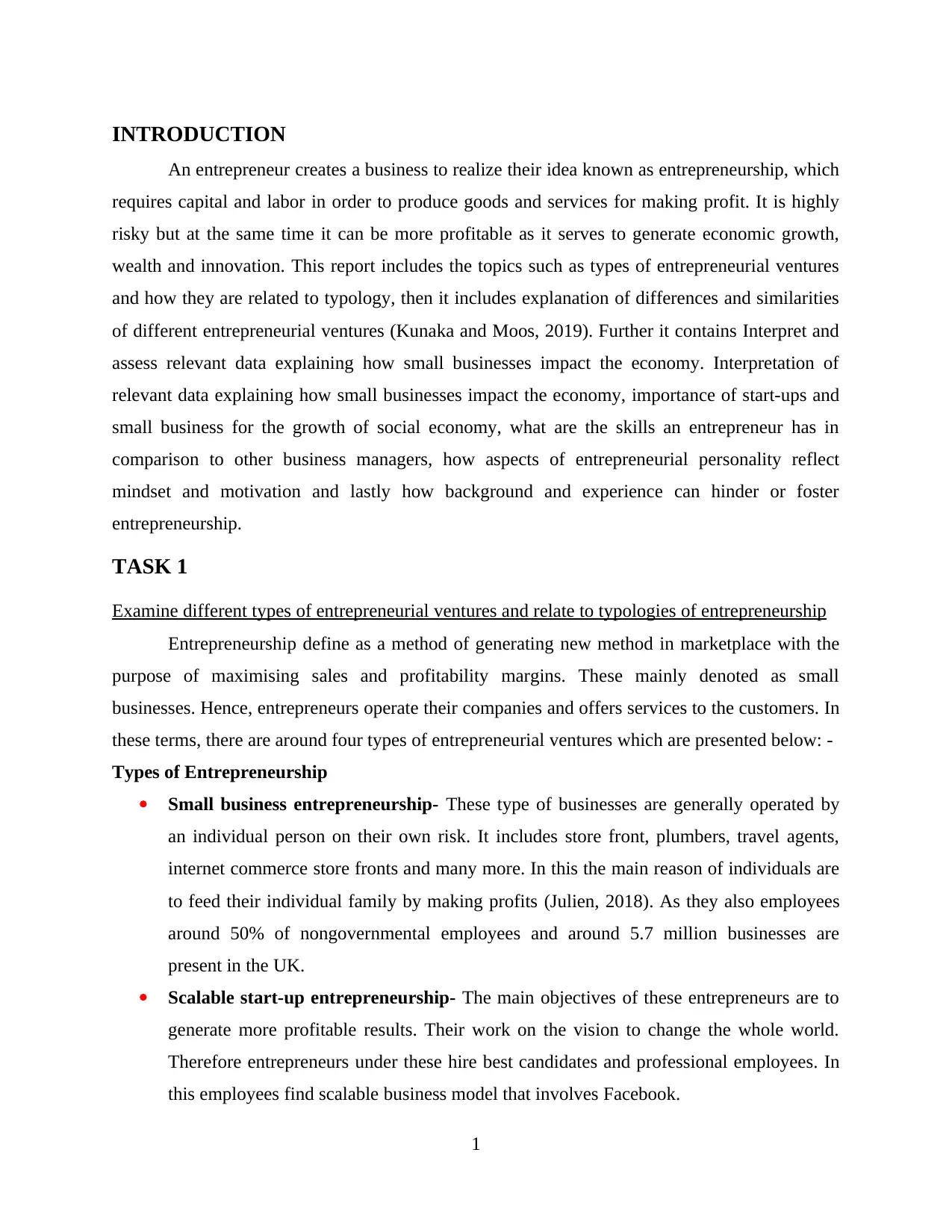
INTRODUCTION
An entrepreneur creates a business to realize their idea known as entrepreneurship, which
requires capital and labor in order to produce goods and services for making profit. It is highly
risky but at the same time it can be more profitable as it serves to generate economic growth,
wealth and innovation. This report includes the topics such as types of entrepreneurial ventures
and how they are related to typology, then it includes explanation of differences and similarities
of different entrepreneurial ventures (Kunaka and Moos, 2019). Further it contains Interpret and
assess relevant data explaining how small businesses impact the economy. Interpretation of
relevant data explaining how small businesses impact the economy, importance of start-ups and
small business for the growth of social economy, what are the skills an entrepreneur has in
comparison to other business managers, how aspects of entrepreneurial personality reflect
mindset and motivation and lastly how background and experience can hinder or foster
entrepreneurship.
TASK 1
Examine different types of entrepreneurial ventures and relate to typologies of entrepreneurship
Entrepreneurship define as a method of generating new method in marketplace with the
purpose of maximising sales and profitability margins. These mainly denoted as small
businesses. Hence, entrepreneurs operate their companies and offers services to the customers. In
these terms, there are around four types of entrepreneurial ventures which are presented below: -
Types of Entrepreneurship
Small business entrepreneurship- These type of businesses are generally operated by
an individual person on their own risk. It includes store front, plumbers, travel agents,
internet commerce store fronts and many more. In this the main reason of individuals are
to feed their individual family by making profits (Julien, 2018). As they also employees
around 50% of nongovernmental employees and around 5.7 million businesses are
present in the UK.
Scalable start-up entrepreneurship- The main objectives of these entrepreneurs are to
generate more profitable results. Their work on the vision to change the whole world.
Therefore entrepreneurs under these hire best candidates and professional employees. In
this employees find scalable business model that involves Facebook.
1
An entrepreneur creates a business to realize their idea known as entrepreneurship, which
requires capital and labor in order to produce goods and services for making profit. It is highly
risky but at the same time it can be more profitable as it serves to generate economic growth,
wealth and innovation. This report includes the topics such as types of entrepreneurial ventures
and how they are related to typology, then it includes explanation of differences and similarities
of different entrepreneurial ventures (Kunaka and Moos, 2019). Further it contains Interpret and
assess relevant data explaining how small businesses impact the economy. Interpretation of
relevant data explaining how small businesses impact the economy, importance of start-ups and
small business for the growth of social economy, what are the skills an entrepreneur has in
comparison to other business managers, how aspects of entrepreneurial personality reflect
mindset and motivation and lastly how background and experience can hinder or foster
entrepreneurship.
TASK 1
Examine different types of entrepreneurial ventures and relate to typologies of entrepreneurship
Entrepreneurship define as a method of generating new method in marketplace with the
purpose of maximising sales and profitability margins. These mainly denoted as small
businesses. Hence, entrepreneurs operate their companies and offers services to the customers. In
these terms, there are around four types of entrepreneurial ventures which are presented below: -
Types of Entrepreneurship
Small business entrepreneurship- These type of businesses are generally operated by
an individual person on their own risk. It includes store front, plumbers, travel agents,
internet commerce store fronts and many more. In this the main reason of individuals are
to feed their individual family by making profits (Julien, 2018). As they also employees
around 50% of nongovernmental employees and around 5.7 million businesses are
present in the UK.
Scalable start-up entrepreneurship- The main objectives of these entrepreneurs are to
generate more profitable results. Their work on the vision to change the whole world.
Therefore entrepreneurs under these hire best candidates and professional employees. In
this employees find scalable business model that involves Facebook.
1
⊘ This is a preview!⊘
Do you want full access?
Subscribe today to unlock all pages.

Trusted by 1+ million students worldwide
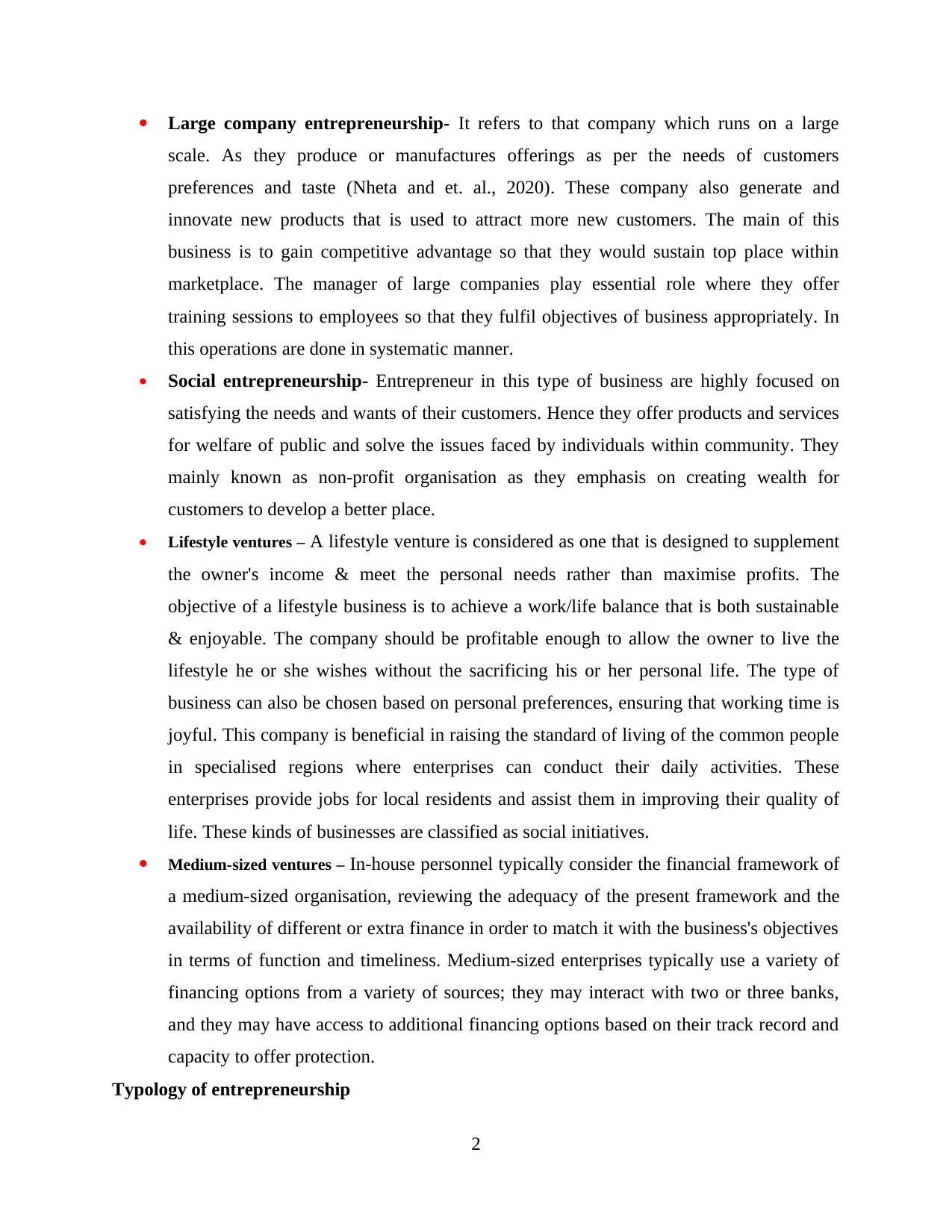
Large company entrepreneurship- It refers to that company which runs on a large
scale. As they produce or manufactures offerings as per the needs of customers
preferences and taste (Nheta and et. al., 2020). These company also generate and
innovate new products that is used to attract more new customers. The main of this
business is to gain competitive advantage so that they would sustain top place within
marketplace. The manager of large companies play essential role where they offer
training sessions to employees so that they fulfil objectives of business appropriately. In
this operations are done in systematic manner.
Social entrepreneurship- Entrepreneur in this type of business are highly focused on
satisfying the needs and wants of their customers. Hence they offer products and services
for welfare of public and solve the issues faced by individuals within community. They
mainly known as non-profit organisation as they emphasis on creating wealth for
customers to develop a better place.
Lifestyle ventures – A lifestyle venture is considered as one that is designed to supplement
the owner's income & meet the personal needs rather than maximise profits. The
objective of a lifestyle business is to achieve a work/life balance that is both sustainable
& enjoyable. The company should be profitable enough to allow the owner to live the
lifestyle he or she wishes without the sacrificing his or her personal life. The type of
business can also be chosen based on personal preferences, ensuring that working time is
joyful. This company is beneficial in raising the standard of living of the common people
in specialised regions where enterprises can conduct their daily activities. These
enterprises provide jobs for local residents and assist them in improving their quality of
life. These kinds of businesses are classified as social initiatives.
Medium-sized ventures – In-house personnel typically consider the financial framework of
a medium-sized organisation, reviewing the adequacy of the present framework and the
availability of different or extra finance in order to match it with the business's objectives
in terms of function and timeliness. Medium-sized enterprises typically use a variety of
financing options from a variety of sources; they may interact with two or three banks,
and they may have access to additional financing options based on their track record and
capacity to offer protection.
Typology of entrepreneurship
2
scale. As they produce or manufactures offerings as per the needs of customers
preferences and taste (Nheta and et. al., 2020). These company also generate and
innovate new products that is used to attract more new customers. The main of this
business is to gain competitive advantage so that they would sustain top place within
marketplace. The manager of large companies play essential role where they offer
training sessions to employees so that they fulfil objectives of business appropriately. In
this operations are done in systematic manner.
Social entrepreneurship- Entrepreneur in this type of business are highly focused on
satisfying the needs and wants of their customers. Hence they offer products and services
for welfare of public and solve the issues faced by individuals within community. They
mainly known as non-profit organisation as they emphasis on creating wealth for
customers to develop a better place.
Lifestyle ventures – A lifestyle venture is considered as one that is designed to supplement
the owner's income & meet the personal needs rather than maximise profits. The
objective of a lifestyle business is to achieve a work/life balance that is both sustainable
& enjoyable. The company should be profitable enough to allow the owner to live the
lifestyle he or she wishes without the sacrificing his or her personal life. The type of
business can also be chosen based on personal preferences, ensuring that working time is
joyful. This company is beneficial in raising the standard of living of the common people
in specialised regions where enterprises can conduct their daily activities. These
enterprises provide jobs for local residents and assist them in improving their quality of
life. These kinds of businesses are classified as social initiatives.
Medium-sized ventures – In-house personnel typically consider the financial framework of
a medium-sized organisation, reviewing the adequacy of the present framework and the
availability of different or extra finance in order to match it with the business's objectives
in terms of function and timeliness. Medium-sized enterprises typically use a variety of
financing options from a variety of sources; they may interact with two or three banks,
and they may have access to additional financing options based on their track record and
capacity to offer protection.
Typology of entrepreneurship
2
Paraphrase This Document
Need a fresh take? Get an instant paraphrase of this document with our AI Paraphraser
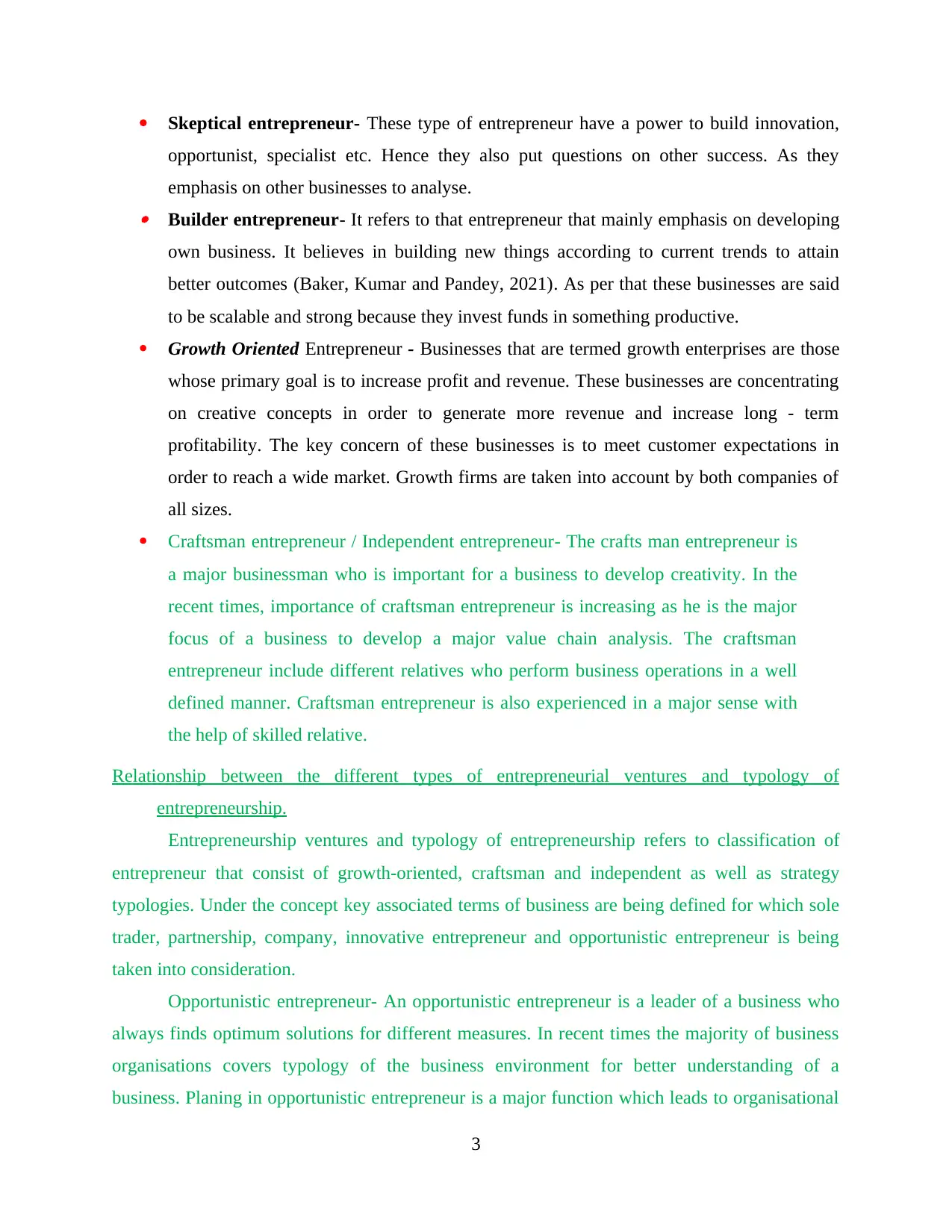
Skeptical entrepreneur- These type of entrepreneur have a power to build innovation,
opportunist, specialist etc. Hence they also put questions on other success. As they
emphasis on other businesses to analyse. Builder entrepreneur- It refers to that entrepreneur that mainly emphasis on developing
own business. It believes in building new things according to current trends to attain
better outcomes (Baker, Kumar and Pandey, 2021). As per that these businesses are said
to be scalable and strong because they invest funds in something productive.
Growth Oriented Entrepreneur - Businesses that are termed growth enterprises are those
whose primary goal is to increase profit and revenue. These businesses are concentrating
on creative concepts in order to generate more revenue and increase long - term
profitability. The key concern of these businesses is to meet customer expectations in
order to reach a wide market. Growth firms are taken into account by both companies of
all sizes.
Craftsman entrepreneur / Independent entrepreneur- The crafts man entrepreneur is
a major businessman who is important for a business to develop creativity. In the
recent times, importance of craftsman entrepreneur is increasing as he is the major
focus of a business to develop a major value chain analysis. The craftsman
entrepreneur include different relatives who perform business operations in a well
defined manner. Craftsman entrepreneur is also experienced in a major sense with
the help of skilled relative.
Relationship between the different types of entrepreneurial ventures and typology of
entrepreneurship.
Entrepreneurship ventures and typology of entrepreneurship refers to classification of
entrepreneur that consist of growth-oriented, craftsman and independent as well as strategy
typologies. Under the concept key associated terms of business are being defined for which sole
trader, partnership, company, innovative entrepreneur and opportunistic entrepreneur is being
taken into consideration.
Opportunistic entrepreneur- An opportunistic entrepreneur is a leader of a business who
always finds optimum solutions for different measures. In recent times the majority of business
organisations covers typology of the business environment for better understanding of a
business. Planing in opportunistic entrepreneur is a major function which leads to organisational
3
opportunist, specialist etc. Hence they also put questions on other success. As they
emphasis on other businesses to analyse. Builder entrepreneur- It refers to that entrepreneur that mainly emphasis on developing
own business. It believes in building new things according to current trends to attain
better outcomes (Baker, Kumar and Pandey, 2021). As per that these businesses are said
to be scalable and strong because they invest funds in something productive.
Growth Oriented Entrepreneur - Businesses that are termed growth enterprises are those
whose primary goal is to increase profit and revenue. These businesses are concentrating
on creative concepts in order to generate more revenue and increase long - term
profitability. The key concern of these businesses is to meet customer expectations in
order to reach a wide market. Growth firms are taken into account by both companies of
all sizes.
Craftsman entrepreneur / Independent entrepreneur- The crafts man entrepreneur is
a major businessman who is important for a business to develop creativity. In the
recent times, importance of craftsman entrepreneur is increasing as he is the major
focus of a business to develop a major value chain analysis. The craftsman
entrepreneur include different relatives who perform business operations in a well
defined manner. Craftsman entrepreneur is also experienced in a major sense with
the help of skilled relative.
Relationship between the different types of entrepreneurial ventures and typology of
entrepreneurship.
Entrepreneurship ventures and typology of entrepreneurship refers to classification of
entrepreneur that consist of growth-oriented, craftsman and independent as well as strategy
typologies. Under the concept key associated terms of business are being defined for which sole
trader, partnership, company, innovative entrepreneur and opportunistic entrepreneur is being
taken into consideration.
Opportunistic entrepreneur- An opportunistic entrepreneur is a leader of a business who
always finds optimum solutions for different measures. In recent times the majority of business
organisations covers typology of the business environment for better understanding of a
business. Planing in opportunistic entrepreneur is a major function which leads to organisational
3
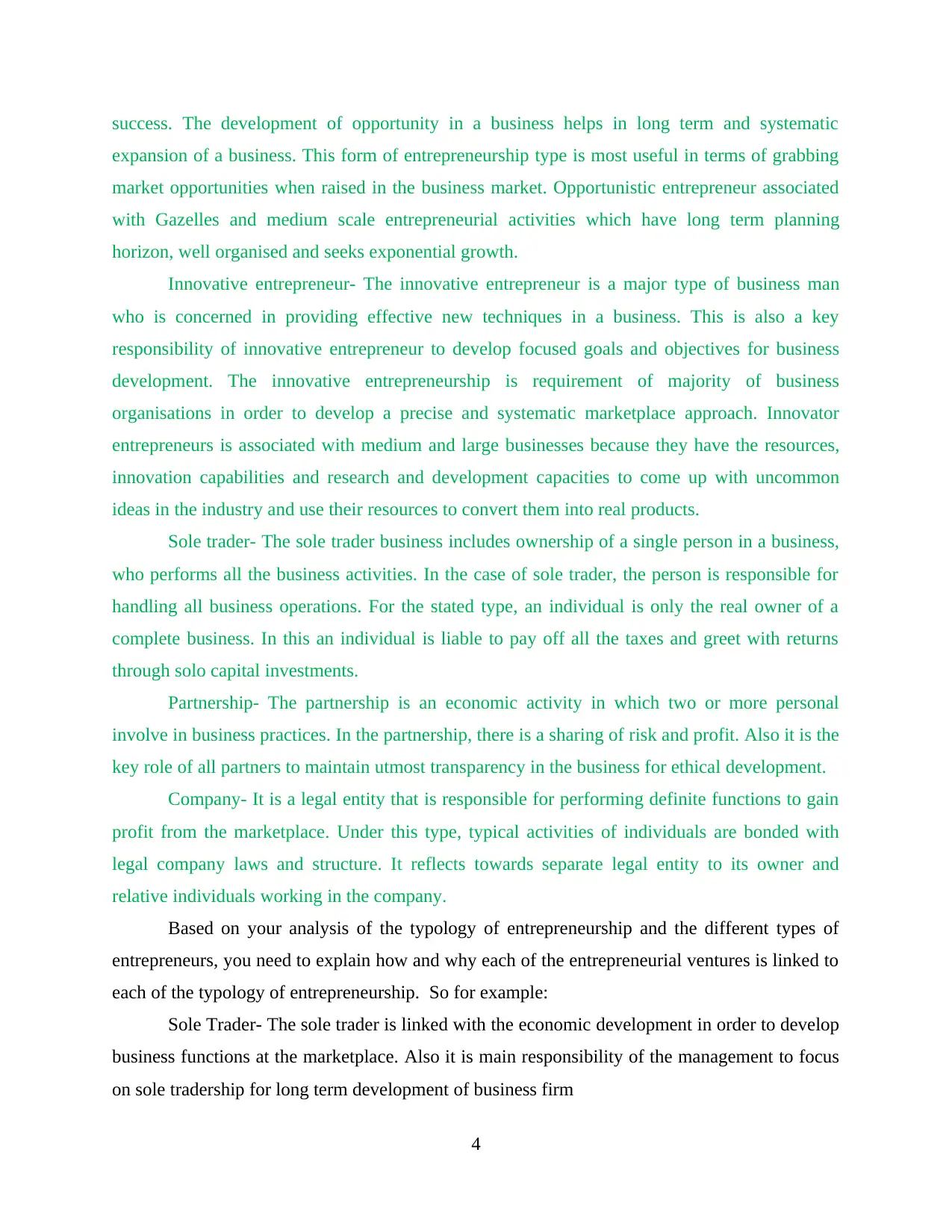
success. The development of opportunity in a business helps in long term and systematic
expansion of a business. This form of entrepreneurship type is most useful in terms of grabbing
market opportunities when raised in the business market. Opportunistic entrepreneur associated
with Gazelles and medium scale entrepreneurial activities which have long term planning
horizon, well organised and seeks exponential growth.
Innovative entrepreneur- The innovative entrepreneur is a major type of business man
who is concerned in providing effective new techniques in a business. This is also a key
responsibility of innovative entrepreneur to develop focused goals and objectives for business
development. The innovative entrepreneurship is requirement of majority of business
organisations in order to develop a precise and systematic marketplace approach. Innovator
entrepreneurs is associated with medium and large businesses because they have the resources,
innovation capabilities and research and development capacities to come up with uncommon
ideas in the industry and use their resources to convert them into real products.
Sole trader- The sole trader business includes ownership of a single person in a business,
who performs all the business activities. In the case of sole trader, the person is responsible for
handling all business operations. For the stated type, an individual is only the real owner of a
complete business. In this an individual is liable to pay off all the taxes and greet with returns
through solo capital investments.
Partnership- The partnership is an economic activity in which two or more personal
involve in business practices. In the partnership, there is a sharing of risk and profit. Also it is the
key role of all partners to maintain utmost transparency in the business for ethical development.
Company- It is a legal entity that is responsible for performing definite functions to gain
profit from the marketplace. Under this type, typical activities of individuals are bonded with
legal company laws and structure. It reflects towards separate legal entity to its owner and
relative individuals working in the company.
Based on your analysis of the typology of entrepreneurship and the different types of
entrepreneurs, you need to explain how and why each of the entrepreneurial ventures is linked to
each of the typology of entrepreneurship. So for example:
Sole Trader- The sole trader is linked with the economic development in order to develop
business functions at the marketplace. Also it is main responsibility of the management to focus
on sole tradership for long term development of business firm
4
expansion of a business. This form of entrepreneurship type is most useful in terms of grabbing
market opportunities when raised in the business market. Opportunistic entrepreneur associated
with Gazelles and medium scale entrepreneurial activities which have long term planning
horizon, well organised and seeks exponential growth.
Innovative entrepreneur- The innovative entrepreneur is a major type of business man
who is concerned in providing effective new techniques in a business. This is also a key
responsibility of innovative entrepreneur to develop focused goals and objectives for business
development. The innovative entrepreneurship is requirement of majority of business
organisations in order to develop a precise and systematic marketplace approach. Innovator
entrepreneurs is associated with medium and large businesses because they have the resources,
innovation capabilities and research and development capacities to come up with uncommon
ideas in the industry and use their resources to convert them into real products.
Sole trader- The sole trader business includes ownership of a single person in a business,
who performs all the business activities. In the case of sole trader, the person is responsible for
handling all business operations. For the stated type, an individual is only the real owner of a
complete business. In this an individual is liable to pay off all the taxes and greet with returns
through solo capital investments.
Partnership- The partnership is an economic activity in which two or more personal
involve in business practices. In the partnership, there is a sharing of risk and profit. Also it is the
key role of all partners to maintain utmost transparency in the business for ethical development.
Company- It is a legal entity that is responsible for performing definite functions to gain
profit from the marketplace. Under this type, typical activities of individuals are bonded with
legal company laws and structure. It reflects towards separate legal entity to its owner and
relative individuals working in the company.
Based on your analysis of the typology of entrepreneurship and the different types of
entrepreneurs, you need to explain how and why each of the entrepreneurial ventures is linked to
each of the typology of entrepreneurship. So for example:
Sole Trader- The sole trader is linked with the economic development in order to develop
business functions at the marketplace. Also it is main responsibility of the management to focus
on sole tradership for long term development of business firm
4
⊘ This is a preview!⊘
Do you want full access?
Subscribe today to unlock all pages.

Trusted by 1+ million students worldwide
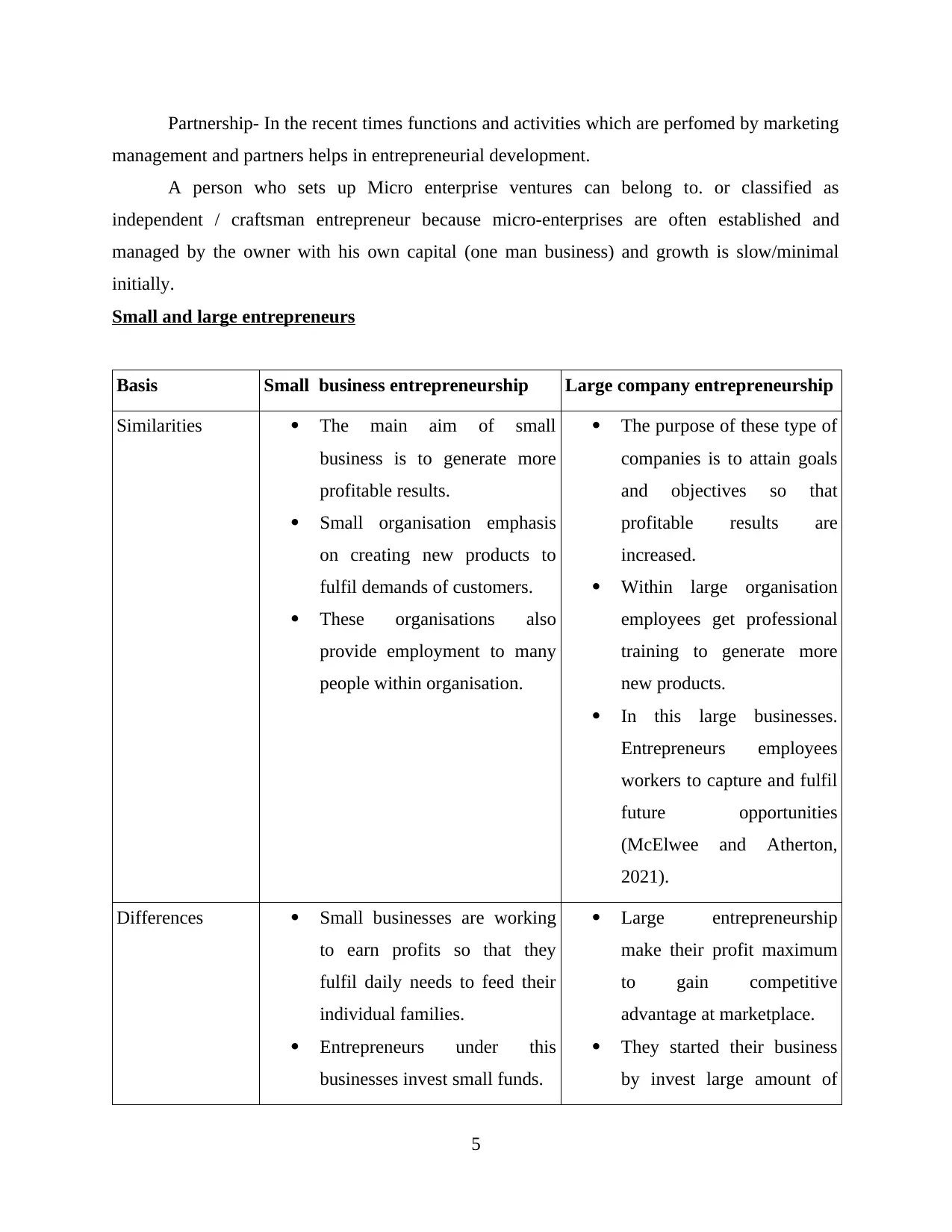
Partnership- In the recent times functions and activities which are perfomed by marketing
management and partners helps in entrepreneurial development.
A person who sets up Micro enterprise ventures can belong to. or classified as
independent / craftsman entrepreneur because micro-enterprises are often established and
managed by the owner with his own capital (one man business) and growth is slow/minimal
initially.
Small and large entrepreneurs
Basis Small business entrepreneurship Large company entrepreneurship
Similarities The main aim of small
business is to generate more
profitable results.
Small organisation emphasis
on creating new products to
fulfil demands of customers.
These organisations also
provide employment to many
people within organisation.
The purpose of these type of
companies is to attain goals
and objectives so that
profitable results are
increased.
Within large organisation
employees get professional
training to generate more
new products.
In this large businesses.
Entrepreneurs employees
workers to capture and fulfil
future opportunities
(McElwee and Atherton,
2021).
Differences Small businesses are working
to earn profits so that they
fulfil daily needs to feed their
individual families.
Entrepreneurs under this
businesses invest small funds.
Large entrepreneurship
make their profit maximum
to gain competitive
advantage at marketplace.
They started their business
by invest large amount of
5
management and partners helps in entrepreneurial development.
A person who sets up Micro enterprise ventures can belong to. or classified as
independent / craftsman entrepreneur because micro-enterprises are often established and
managed by the owner with his own capital (one man business) and growth is slow/minimal
initially.
Small and large entrepreneurs
Basis Small business entrepreneurship Large company entrepreneurship
Similarities The main aim of small
business is to generate more
profitable results.
Small organisation emphasis
on creating new products to
fulfil demands of customers.
These organisations also
provide employment to many
people within organisation.
The purpose of these type of
companies is to attain goals
and objectives so that
profitable results are
increased.
Within large organisation
employees get professional
training to generate more
new products.
In this large businesses.
Entrepreneurs employees
workers to capture and fulfil
future opportunities
(McElwee and Atherton,
2021).
Differences Small businesses are working
to earn profits so that they
fulfil daily needs to feed their
individual families.
Entrepreneurs under this
businesses invest small funds.
Large entrepreneurship
make their profit maximum
to gain competitive
advantage at marketplace.
They started their business
by invest large amount of
5
Paraphrase This Document
Need a fresh take? Get an instant paraphrase of this document with our AI Paraphraser
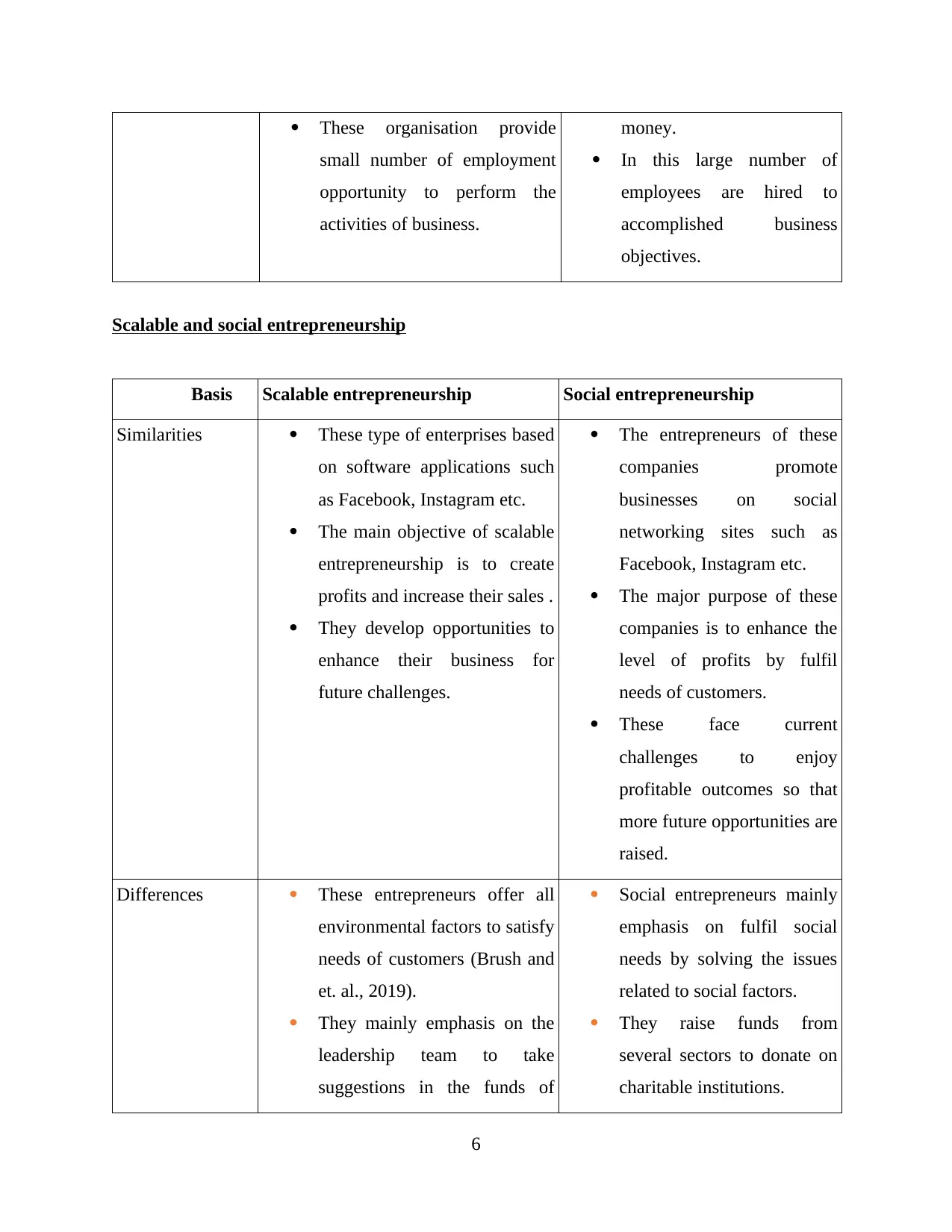
These organisation provide
small number of employment
opportunity to perform the
activities of business.
money.
In this large number of
employees are hired to
accomplished business
objectives.
Scalable and social entrepreneurship
Basis Scalable entrepreneurship Social entrepreneurship
Similarities These type of enterprises based
on software applications such
as Facebook, Instagram etc.
The main objective of scalable
entrepreneurship is to create
profits and increase their sales .
They develop opportunities to
enhance their business for
future challenges.
The entrepreneurs of these
companies promote
businesses on social
networking sites such as
Facebook, Instagram etc.
The major purpose of these
companies is to enhance the
level of profits by fulfil
needs of customers.
These face current
challenges to enjoy
profitable outcomes so that
more future opportunities are
raised.
Differences These entrepreneurs offer all
environmental factors to satisfy
needs of customers (Brush and
et. al., 2019).
They mainly emphasis on the
leadership team to take
suggestions in the funds of
Social entrepreneurs mainly
emphasis on fulfil social
needs by solving the issues
related to social factors.
They raise funds from
several sectors to donate on
charitable institutions.
6
small number of employment
opportunity to perform the
activities of business.
money.
In this large number of
employees are hired to
accomplished business
objectives.
Scalable and social entrepreneurship
Basis Scalable entrepreneurship Social entrepreneurship
Similarities These type of enterprises based
on software applications such
as Facebook, Instagram etc.
The main objective of scalable
entrepreneurship is to create
profits and increase their sales .
They develop opportunities to
enhance their business for
future challenges.
The entrepreneurs of these
companies promote
businesses on social
networking sites such as
Facebook, Instagram etc.
The major purpose of these
companies is to enhance the
level of profits by fulfil
needs of customers.
These face current
challenges to enjoy
profitable outcomes so that
more future opportunities are
raised.
Differences These entrepreneurs offer all
environmental factors to satisfy
needs of customers (Brush and
et. al., 2019).
They mainly emphasis on the
leadership team to take
suggestions in the funds of
Social entrepreneurs mainly
emphasis on fulfil social
needs by solving the issues
related to social factors.
They raise funds from
several sectors to donate on
charitable institutions.
6
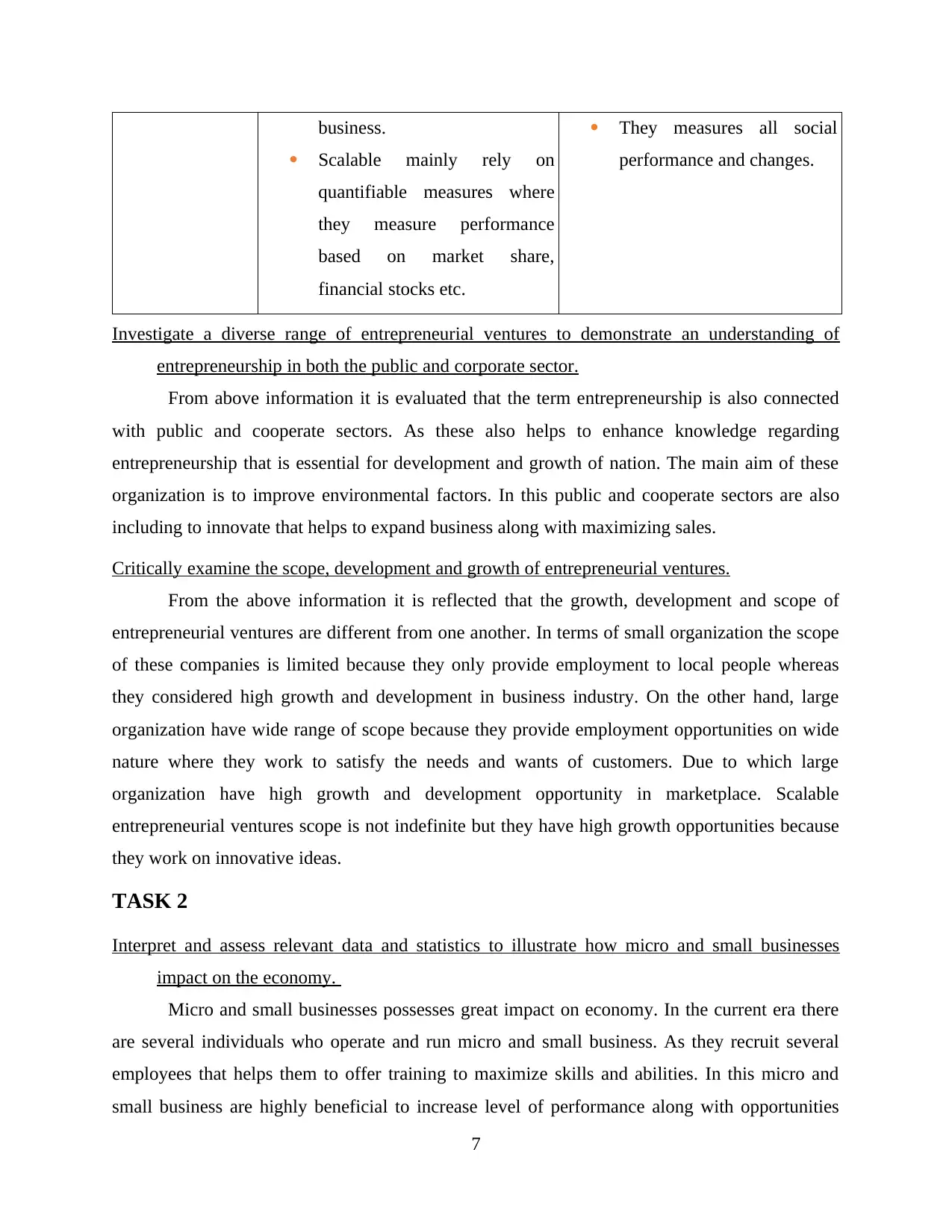
business.
Scalable mainly rely on
quantifiable measures where
they measure performance
based on market share,
financial stocks etc.
They measures all social
performance and changes.
Investigate a diverse range of entrepreneurial ventures to demonstrate an understanding of
entrepreneurship in both the public and corporate sector.
From above information it is evaluated that the term entrepreneurship is also connected
with public and cooperate sectors. As these also helps to enhance knowledge regarding
entrepreneurship that is essential for development and growth of nation. The main aim of these
organization is to improve environmental factors. In this public and cooperate sectors are also
including to innovate that helps to expand business along with maximizing sales.
Critically examine the scope, development and growth of entrepreneurial ventures.
From the above information it is reflected that the growth, development and scope of
entrepreneurial ventures are different from one another. In terms of small organization the scope
of these companies is limited because they only provide employment to local people whereas
they considered high growth and development in business industry. On the other hand, large
organization have wide range of scope because they provide employment opportunities on wide
nature where they work to satisfy the needs and wants of customers. Due to which large
organization have high growth and development opportunity in marketplace. Scalable
entrepreneurial ventures scope is not indefinite but they have high growth opportunities because
they work on innovative ideas.
TASK 2
Interpret and assess relevant data and statistics to illustrate how micro and small businesses
impact on the economy.
Micro and small businesses possesses great impact on economy. In the current era there
are several individuals who operate and run micro and small business. As they recruit several
employees that helps them to offer training to maximize skills and abilities. In this micro and
small business are highly beneficial to increase level of performance along with opportunities
7
Scalable mainly rely on
quantifiable measures where
they measure performance
based on market share,
financial stocks etc.
They measures all social
performance and changes.
Investigate a diverse range of entrepreneurial ventures to demonstrate an understanding of
entrepreneurship in both the public and corporate sector.
From above information it is evaluated that the term entrepreneurship is also connected
with public and cooperate sectors. As these also helps to enhance knowledge regarding
entrepreneurship that is essential for development and growth of nation. The main aim of these
organization is to improve environmental factors. In this public and cooperate sectors are also
including to innovate that helps to expand business along with maximizing sales.
Critically examine the scope, development and growth of entrepreneurial ventures.
From the above information it is reflected that the growth, development and scope of
entrepreneurial ventures are different from one another. In terms of small organization the scope
of these companies is limited because they only provide employment to local people whereas
they considered high growth and development in business industry. On the other hand, large
organization have wide range of scope because they provide employment opportunities on wide
nature where they work to satisfy the needs and wants of customers. Due to which large
organization have high growth and development opportunity in marketplace. Scalable
entrepreneurial ventures scope is not indefinite but they have high growth opportunities because
they work on innovative ideas.
TASK 2
Interpret and assess relevant data and statistics to illustrate how micro and small businesses
impact on the economy.
Micro and small businesses possesses great impact on economy. In the current era there
are several individuals who operate and run micro and small business. As they recruit several
employees that helps them to offer training to maximize skills and abilities. In this micro and
small business are highly beneficial to increase level of performance along with opportunities
7
⊘ This is a preview!⊘
Do you want full access?
Subscribe today to unlock all pages.

Trusted by 1+ million students worldwide
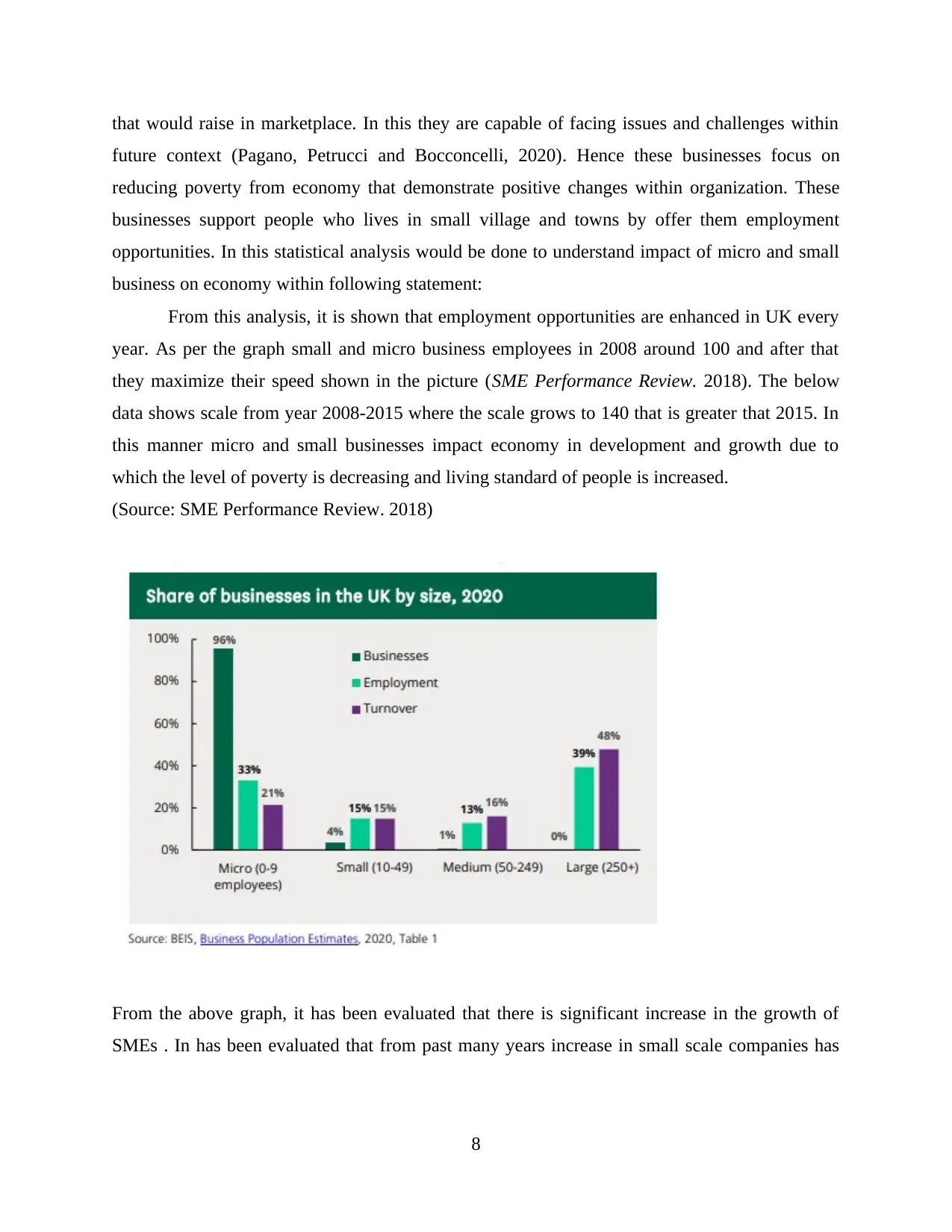
that would raise in marketplace. In this they are capable of facing issues and challenges within
future context (Pagano, Petrucci and Bocconcelli, 2020). Hence these businesses focus on
reducing poverty from economy that demonstrate positive changes within organization. These
businesses support people who lives in small village and towns by offer them employment
opportunities. In this statistical analysis would be done to understand impact of micro and small
business on economy within following statement:
From this analysis, it is shown that employment opportunities are enhanced in UK every
year. As per the graph small and micro business employees in 2008 around 100 and after that
they maximize their speed shown in the picture (SME Performance Review. 2018). The below
data shows scale from year 2008-2015 where the scale grows to 140 that is greater that 2015. In
this manner micro and small businesses impact economy in development and growth due to
which the level of poverty is decreasing and living standard of people is increased.
(Source: SME Performance Review. 2018)
From the above graph, it has been evaluated that there is significant increase in the growth of
SMEs . In has been evaluated that from past many years increase in small scale companies has
8
future context (Pagano, Petrucci and Bocconcelli, 2020). Hence these businesses focus on
reducing poverty from economy that demonstrate positive changes within organization. These
businesses support people who lives in small village and towns by offer them employment
opportunities. In this statistical analysis would be done to understand impact of micro and small
business on economy within following statement:
From this analysis, it is shown that employment opportunities are enhanced in UK every
year. As per the graph small and micro business employees in 2008 around 100 and after that
they maximize their speed shown in the picture (SME Performance Review. 2018). The below
data shows scale from year 2008-2015 where the scale grows to 140 that is greater that 2015. In
this manner micro and small businesses impact economy in development and growth due to
which the level of poverty is decreasing and living standard of people is increased.
(Source: SME Performance Review. 2018)
From the above graph, it has been evaluated that there is significant increase in the growth of
SMEs . In has been evaluated that from past many years increase in small scale companies has
8
Paraphrase This Document
Need a fresh take? Get an instant paraphrase of this document with our AI Paraphraser
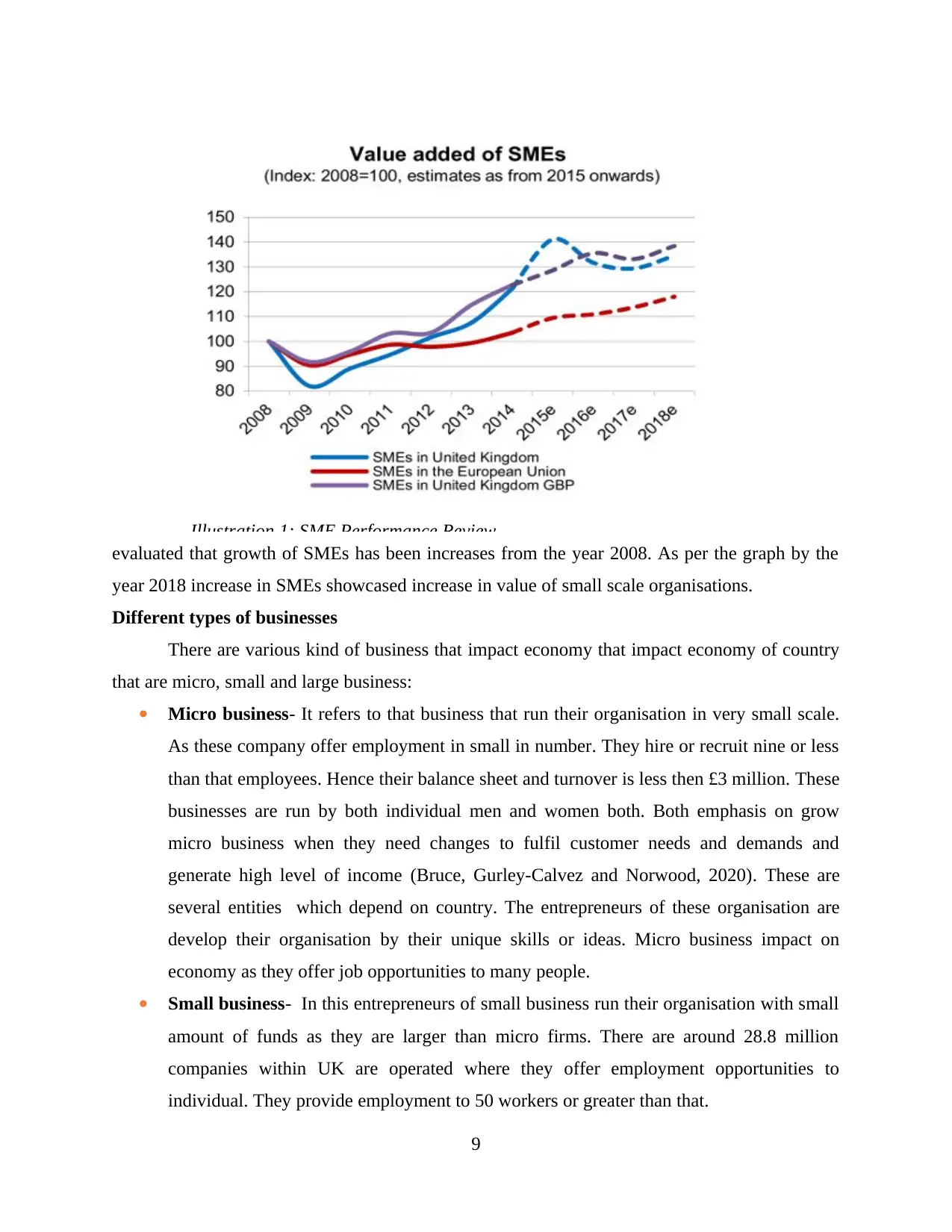
evaluated that growth of SMEs has been increases from the year 2008. As per the graph by the
year 2018 increase in SMEs showcased increase in value of small scale organisations.
Different types of businesses
There are various kind of business that impact economy that impact economy of country
that are micro, small and large business:
Micro business- It refers to that business that run their organisation in very small scale.
As these company offer employment in small in number. They hire or recruit nine or less
than that employees. Hence their balance sheet and turnover is less then £3 million. These
businesses are run by both individual men and women both. Both emphasis on grow
micro business when they need changes to fulfil customer needs and demands and
generate high level of income (Bruce, Gurley-Calvez and Norwood, 2020). These are
several entities which depend on country. The entrepreneurs of these organisation are
develop their organisation by their unique skills or ideas. Micro business impact on
economy as they offer job opportunities to many people.
Small business- In this entrepreneurs of small business run their organisation with small
amount of funds as they are larger than micro firms. There are around 28.8 million
companies within UK are operated where they offer employment opportunities to
individual. They provide employment to 50 workers or greater than that.
9
Illustration 1: SME Performance Review
year 2018 increase in SMEs showcased increase in value of small scale organisations.
Different types of businesses
There are various kind of business that impact economy that impact economy of country
that are micro, small and large business:
Micro business- It refers to that business that run their organisation in very small scale.
As these company offer employment in small in number. They hire or recruit nine or less
than that employees. Hence their balance sheet and turnover is less then £3 million. These
businesses are run by both individual men and women both. Both emphasis on grow
micro business when they need changes to fulfil customer needs and demands and
generate high level of income (Bruce, Gurley-Calvez and Norwood, 2020). These are
several entities which depend on country. The entrepreneurs of these organisation are
develop their organisation by their unique skills or ideas. Micro business impact on
economy as they offer job opportunities to many people.
Small business- In this entrepreneurs of small business run their organisation with small
amount of funds as they are larger than micro firms. There are around 28.8 million
companies within UK are operated where they offer employment opportunities to
individual. They provide employment to 50 workers or greater than that.
9
Illustration 1: SME Performance Review
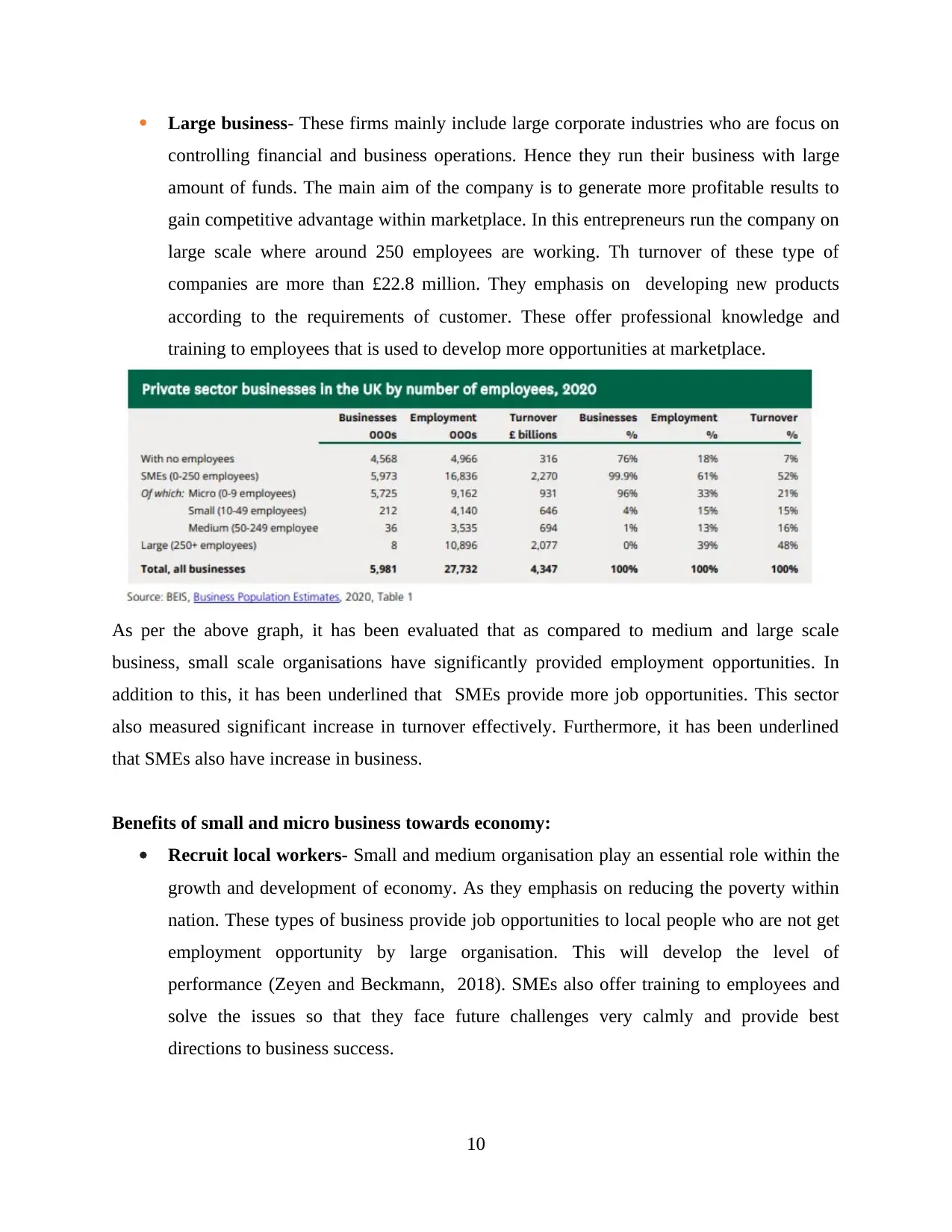
Large business- These firms mainly include large corporate industries who are focus on
controlling financial and business operations. Hence they run their business with large
amount of funds. The main aim of the company is to generate more profitable results to
gain competitive advantage within marketplace. In this entrepreneurs run the company on
large scale where around 250 employees are working. Th turnover of these type of
companies are more than £22.8 million. They emphasis on developing new products
according to the requirements of customer. These offer professional knowledge and
training to employees that is used to develop more opportunities at marketplace.
As per the above graph, it has been evaluated that as compared to medium and large scale
business, small scale organisations have significantly provided employment opportunities. In
addition to this, it has been underlined that SMEs provide more job opportunities. This sector
also measured significant increase in turnover effectively. Furthermore, it has been underlined
that SMEs also have increase in business.
Benefits of small and micro business towards economy:
Recruit local workers- Small and medium organisation play an essential role within the
growth and development of economy. As they emphasis on reducing the poverty within
nation. These types of business provide job opportunities to local people who are not get
employment opportunity by large organisation. This will develop the level of
performance (Zeyen and Beckmann, 2018). SMEs also offer training to employees and
solve the issues so that they face future challenges very calmly and provide best
directions to business success.
10
controlling financial and business operations. Hence they run their business with large
amount of funds. The main aim of the company is to generate more profitable results to
gain competitive advantage within marketplace. In this entrepreneurs run the company on
large scale where around 250 employees are working. Th turnover of these type of
companies are more than £22.8 million. They emphasis on developing new products
according to the requirements of customer. These offer professional knowledge and
training to employees that is used to develop more opportunities at marketplace.
As per the above graph, it has been evaluated that as compared to medium and large scale
business, small scale organisations have significantly provided employment opportunities. In
addition to this, it has been underlined that SMEs provide more job opportunities. This sector
also measured significant increase in turnover effectively. Furthermore, it has been underlined
that SMEs also have increase in business.
Benefits of small and micro business towards economy:
Recruit local workers- Small and medium organisation play an essential role within the
growth and development of economy. As they emphasis on reducing the poverty within
nation. These types of business provide job opportunities to local people who are not get
employment opportunity by large organisation. This will develop the level of
performance (Zeyen and Beckmann, 2018). SMEs also offer training to employees and
solve the issues so that they face future challenges very calmly and provide best
directions to business success.
10
⊘ This is a preview!⊘
Do you want full access?
Subscribe today to unlock all pages.

Trusted by 1+ million students worldwide
1 out of 26
Related Documents
Your All-in-One AI-Powered Toolkit for Academic Success.
+13062052269
info@desklib.com
Available 24*7 on WhatsApp / Email
![[object Object]](/_next/static/media/star-bottom.7253800d.svg)
Unlock your academic potential
Copyright © 2020–2026 A2Z Services. All Rights Reserved. Developed and managed by ZUCOL.




